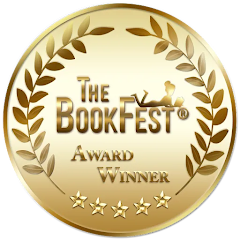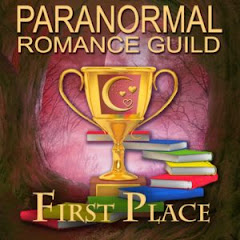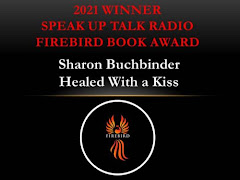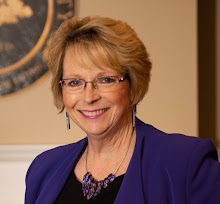 What made you decide to be an author? To be honest, for both of us, there’s not much else we’re suited for.
What made you decide to be an author? To be honest, for both of us, there’s not much else we’re suited for.What do you like best about being a writer? What do you like the least? There are two best parts about being a writer. The first best thing is creating worlds from scratch. It’s very god-like, creating people and places that readers believe in and want to get to know. Writing feeds a tiny core of narcissism buried in a thick layer of insecurity. The second best thing about writing is that beautiful, ineffable, soaring and spiritual feeling when everything just clicks and the words come rushing out onto the page and you just know they are perfect and powerful and timeless. It’s addicting; and also, sadly, it’s short-lived. Not too mention the fact that the aforementioned insecurity often quickly degrades the magic.
The worst part about being a writer is anything that stands between you and that moment of creative bliss, most notably, marketing. Followed, in order, by editing, boring social events and paying jobs, and poverty.
Do you think your life experiences have prepared you for writing? Absolutely. In fact, our life is mirrored, in some ways, in the series itself. The origins story for The Cowboy and the Vampire Collection goes something like this: We (Clark and Kathleen) fell in love, and it was overwhelming and passionate and fiery and amazing and self-combusted within six months (no surprise there). After two years of living apart and thinking and drinking and not-talking and trying to be with other people, the jagged edges of our hearts began to heal. Independently and more or less simultaneously, we both lurched toward the conclusion that life would be better together, if — and it was a big if — we could find a way to contain and redirect the energy in positive ways. Once we agreed on that point, we met on neutral territory — an isolated truck stop in Madras, Oregon — where we cautiously decided to give it another go, only this time with ground rules: a shared focus on creative writing. It was the only strategy we could come up with that gave us a fighting chance to harness and refocus some of the destructive energy that burned us down. And so, The Cowboy and the Vampire Collection was born — sketched out on the back of a placemat in crayon over cigarettes (we’ve since quit, mostly) and black coffee, and featuring the travails of romantic protagonists who mirrored our own opposites-attract and gloriously dysfunctional relationship. What is more opposite than a cowboy and a vampire? Read more about how the “origins story” on our webpage, along with pretty cool poem called “The Ballad of the Cowboy and the Vampire” written for our wedding day.
Have you ever felt as if you were being dictated to while you wrote a book--as if the words came of their own accord? If yes, which book did that happen with? While we both share a fascination with spiritualism, in general, and spirit writing specifically, we haven’t yet found a spirit guide willing to help out in ANY way related to writing. Quite the opposite; it seems our spirit guides are actively working against creative focus by making cocktails so drinkable and Netflix so damn watchable.
We try our best to block them out and stay focused on the project. With a solid plot to guide us, the benefit of a partner able to provide support and momentum when needed (also known as nagging) and a deep trust in each other, our shared skill and our characters, the work flows out as if guided by an unseen hand. It gets back to that part about the addictive nature of writing “in the groove.” The groove is always ready, it’s just sometimes we have to get out of our own way.
You’ve written four novels for The Cowboy and the Vampire Collection, and are working on a new mystery series. What’s your favorite time management tip? This is gong to sound like writing 101, but set goals. We sketch out the plot in advance, develop character sketches, build timelines of the action and even draw up maps of the places we’re writing about. Then we assign ourselves chapters and deadlines and then, as mentioned above, get out of our own way and just write as much as possible whenever we can. We carry notebooks and use the note functions on our devices to capture good ideas. We also try to limit social engagements, but that’s probably because we’re both a little introverted, or maybe socially agnostic is a better term. We also like to take long walks together to talk about chapters or even marketing ideas. The best, very best, are the road trips where we have this great, visually stimulating quality time. Some of the best ideas for books have come from road trips.
Are you a plotter or a pantser, i.e., do you outline your books ahead of time or are you an “organic” writer? Pure, unapologetic plotters.
We have been writing — together and separately, creatively and professionally — for decades now. With paychecks, sanity and romance often hanging in the balance, getting it mostly right the first time is vital. We don’t leave much to chance any more when it comes to first drafts, otherwise we risk letting the characters or plot drift into dark alleys. And life is way too short, and the process way too painful and time-consuming to “back-write.”
And truthfully, we don’t think it’s fair to readers to amble or let chance dictate story-telling. That’s why we have such a strong process for each book we write: detailed character sketches for new characters (and a museum for existing characters), a fairly strong plot stress tested in advance of the first words hitting the page, and knowledge of how the book begins, how the characters change, and how the book ends. Next comes a chapter-by-chapter line up. It’s loose enough to allow creativity, but focused enough to keep us moving through it at a pretty brisk pace.
If we stick to the process, we end up with a first draft that is so good, so polished, so logically consistent, so grounded in classic storytelling techniques, that it only requires a few thousand edits to get it print ready.
If you had one take away piece of advice for authors, what would it be? Write. Sit down, and write now. Write some more. Take a break if you must, but then write some more. The sign of a true writer is someone who actually writes, even when it’s more fun to go swimming, watch a movie, or hang with your honey. That’s all it takes. Words moving from head to paper. So stay out of your own way and repeat this mantra: “Just write — you can fix it in the editing process.”
Did music help you find your muse with this book? If yes, which song did you find yourself going back to over and over again as you wrote? The soundtrack to our books is classic country. Classic country from the 1950s and 1960s has the raw, heartbroken emotion of bone-deep despair that makes the blood run cold one minute and hot the next. It’s perfect for a mash-up of the undead with cowboys. Over the course of their torrid, doomed romance, Tucker — a broke cowboy with duct-taped boots whose best friend is an overly sensitive cowdog named Rex — introduces Lizzie, the unexpected love of his life and a tragically unwilling vampire, to the realities of rural life and to the royalty of country music. For example, Buck Owens — “Excuse Me (I Think I’ve Got a Heartache)” and “Play Together Again Again,” are LonePine favorites. Cowboys always assume love will break a man, and Tucker is no exception. These songs might have been playing over the loudspeaker during the monthly jackpot roping at Cooper Ranch where Tucker and Lizzie first meet.
Tell me more about The Last Sunset. The Last Sunset is the fourth book in The Cowboy and the Vampire Collection. The first book in the series (A Very Unusual Romance) was published in 1999, meaning it helped start the vampire craze! The Cowboy and the Vampire Collection is a genre mash-up that helped blaze the trail leading to a re-imagining of the vampire metaphor for a modern audience and the resulting undead pop-cultural explosion. Witty, sexy and authentically western, the four books deftly navigate the darkest sides of human nature while celebrating the power of love; the series has been called everything from a campy cult horror classic to a trailblazer in its own new genre: Western Gothic.
About the books: First published in 1999, The Cowboy and the Vampire Collection is a genre mash-up. Critics and readers praise the four books as witty, outstandingly entertaining, authentically western, existential, provocatively sensual, thrilling, and more. The series navigates the darkest sides of human nature while celebrating the power of love, blazing a trail to its own new genre: Western Gothic. Let ‘er buck.
The Cowboy and the Vampire: The La
 st
Sunset is the fourth book in award-winning The Cowboy and the Vampire
Collection, a series called everything from cult classic to trailblazer in a
new genre: Western Gothic.
st
Sunset is the fourth book in award-winning The Cowboy and the Vampire
Collection, a series called everything from cult classic to trailblazer in a
new genre: Western Gothic.
Take one long, last look at
LonePine, Wyoming, population 438. It’s been two years since the vampires quit
the quirky little town and things are mostly back to normal — broken dreams and
never enough whiskey. But that’s about to go to hell.
Hold on tight for a midnight
showdown when a psychotic religious order takes the entire town hostage —
including Tucker's long-lost brother — to lure Lizzie from her frozen exile in
Russia. The mad monks know Lizzie’s murder will strand the ruling vampire elite
in a disembodied afterlife so the cult can impose their twisted beliefs on the
living and undead alike. It’s a rip-roarin’ stampede as a cowboy and a vampire
try to round up the shattered pieces of their unusual romance.
With the fate of the world on the
line yet again, can Tucker and Lizzie put aside their broken hearts to face one
last sunset together?
Slap leather or reach for the sky.
This is the fourth book in The
Cowboy and the Vampire Collection.
Excerpt:
The first few months were anguish. But then she threw herself into bringing order to her inherited chaos. If she was to run this vampire shit show, she would run it right. And she had, intensely, ruthlessly, for the first year.Now, everyone knew the rules, knew the consequences for breaking the coda, and—if grudgingly—understood the wisdom behind the annual allocation. She kept her word, showing no favoritism. Nine turns picked by the Council, followed by one pick for Lizzie, with nine nights of rest. By the end of the first year, a fragile trust in her leadership was established.By the beginning of the second year of her self-imposed exile, as the intensity of the work began to wane, she realized something had shifted. The full weight of her future lodged permanently, sadly, in her soul.Rurik, forever circling like a handsome vulture, sensed the change.“Finally, you admit to yourself he is not coming for you,” Rurik said.“I knew he wouldn’t come,” Lizzie said, more sharply than intended.“I’m not the one who requires persuading on this point,” Rurik said. “But no matter the reason, I am pleased. Stop working so hard. Amuse yourself with the privileges and pleasures your position affords. You can have anything you want, with no punishment.”“Punishment?”“From the society you once valued, or from yourself,” Rurik said. “You are free from guilt, free of all constraints, free to act upon your desires and to assume the glorious existence that awaits only your assent.”Rurik felt something akin to compassion as he watched Lizzie struggle to control her emotions, mistaking liberation for captivity. He was right in one sense, though; she was coming to the same realization all vampires faced at some point in their long, undead existence, even those whose turning was consensual: there was no going back.Yes, Lizzie thought, defiantly, as the first year passed into the second. If she was no longer ever to be a human, she might as well have fun. Why the hell not? She submerged herself into her passions and found that although not exactly fulfilling, it was diverting, covering her nightly routines with a shroud of hedonistic numbness that prevented any feelings at all—other than immediate pleasure—from surfacing.She would never admit it, ever, but Rurik was right on another point. She had waited. She had hoped he would come for her, but why would he? She made it clear by breaking his heart that they would never be together. That he believed her ruse broke her heart.Such a sad and dusty little tragedy, she thought, clutching the railing. A shadow by the lake’s edge caught her eye—Rurik, out with his dogs.He felt her gaze and looked up, taking in her nude body and letting his senses wash over it, the closest—it seemed—he would come to possessing her, at least for the time being.She could feel his heart stuttering, but held her own body in perfect check until he averted his eyes and continued his walk.Lizzie once again considered whether it was time to move. Rurik’s home was spacious and lonely and safe and remote, and while he had been a good host to her, he enjoyed the power of proximity over the other tribes, and she understood he was motivated by a hope of his own.“It is inevitable that you and I come together,” he once told her. “You have known this since we first met in that godforsaken American outpost.”“Nothing is inevitable,” she said. Thwarting his passions had become a habit.She wondered if Rurik ever missed the man he had once been, the brilliant military strategist who helped turn back the crusaders all those many years ago in a battle for Russia’s soul. “Ironic that you lost your soul in the process,” she said aloud and in his direction.Her private cell phone buzzed on the bedside table. Lizzie padded back into the room, the wolfhound in tow.Elita. She picked up the phone.“Yes?”“My queen,” Elita said, managing to sound both sarcastic and reverential. Was there a difference, Lizzie wondered?“My loyal subject, my lovely maid-in-waiting,” Lizzie replied. In all this madness, Elita was her only certainty.“Whatever that means,” Elita said. “How’s the frozen tundra treating you?”“Still frozen. Have you wrestled the American Royals and the Reptiles into peaceful coexistence?”“We’re making progress, one corpse at a time.”“When will you visit?” Lizzie asked.“I’m on my way now,” Elita said.Lizzie paused. That was not a good sign. “That’s a welcome, but unexpected surprise.”“What I must tell you may not be so welcome.”“Tell me now,” Lizzie said.“I’ll save the details until I can tell you face to face, but in brief, I’ve heard rumblings, screaming really, that you have a new enemy.”“Why would that concern me?”“Keep your guard up until I arrive.”“My guard is never down,” Lizzie said, breaking the connection.
Between the two of them, Clark Hays and Kathleen McFall have worked in writing jobs ranging from cowboy-poet to energy journalist to restaurant reviewer to university press officer. After they met, their writing career took center stage when they wrote the first book in The Cowboy and the Vampire Collection as a test for marriage. They passed. Clark and Kathleen now live in Portland, Oregon.
Website: www.cowboyandvampire.com
Facebook: www.facebook.com/cowboyandvampire
Twitter: https://twitter.com/cowboyvamp
Instagram: https://www.instagram.com/cowboyvampire/
Tour giveaway
1 set of author-signed copies of the
full four-book collection













































Sharon, thanks so much for letting us spend some time on your page talking about ourselves (we're such narcissists!?!), our writing and The Cowboy and the Vampire Collection. We appreciate the time you spend helping other authors. Let us know if we can return the favor in any way (other than already adding your books to our TBR list).
ReplyDelete